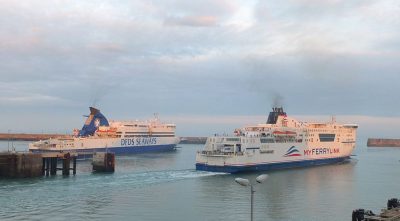Brexit: British Lorries to be Turned Back at Dover by Shipping Companies

British lorries that do not have proper documentation will not be able to reach France after a no-deal Brexit because shipping companies will not allow them to board their ships in Dover. These trucks are going to be turned back at Dover, as the Telegraph reports about an agreement between the port of Calais and shipping companies.
In January, the French port manager informed the public that, after Brexit, lorries would not have to expect any major disruptions in Calais because the newly installed license plate recognition system would make the checking process fast and smooth. However, it seems that this happens if the trucks have already passed through customs in Dover and all the papers are found to be okay. Trucks whose documents are incomplete or not satisfactory according to the control carried out by the shipping company in Dover, will not be allowed to board the ships and must stay in Dover.
Jean-Marc (Jean-Marc Puissesseau, president of the company operating the port of Calais – ed.) has made it very clear that Calais has a deal with shipping companies in Dover that any truck without the proper paperwork won’t be allowed to board,” Richard Burnett, chief executive of the British Road Haulage Association said to the Telegraph. „They won’t send over anything that isn’t pre-cleared. And that means those that don’t will be turned around.”
The British side of the story
While the British are outraged by this agreement, Brexit preparations do not seem to be running smoothly on the island. Once Brexit was postponed, Kent County Council Highways announced they were “standing down” work on Operation Brock, the £15 million process to create a contraflow system on the M20 from Folkestone to help ease potential disruption after a no deal Brexit.
Three months have passed since the last decision of the postponement but the British government is still not sure whether there is any kind of deal that they would be happy to make with the EU, or if they prefer a no-deal Brexit.
Due to the uncertainty, British companies are left helpless with what is necessary to be done before the exit. According to Burnett, only 40 percent of the British transport companies that carry out import-export services have already registered for customs declaration and received an Economic Operator Registration and Identification (EORI) number – which is a must to be able to carry on transporting between the European Union and the United Kingdom after Brexit.
Therefore, Road Haulage Association chief executive, Richard Burnett urges the British government to do more to prepare the industry for a ‘no-deal’ Brexit. According to the press release of the RHA, the following tasks are among the most important ones:
- produce clear guidance on how the whole end-to-end journey will operate;
- open and authorise new and substantial customs facilities for transit;
- introduce consolidated and simplified import safety & security declaration system;
- launch online customs training for traders;
- make lorry holding facilities such as Operation Brock fit for purpose;
- abolish the 22% tariff on new trucks.
A permanent 12-hour delay for the 10,000 trucks that use the Dover Strait each day would cost £2.2 billion per year in each direction in lorry operating costs alone.
He pointed out that the 22% tariff on new trucks from the EU would make it beyond the reach of the average operator as they face daily charges of up to £100 to enter clean air zones with non-Euro VI trucks.
*
Note to readers: please click the share buttons above or below. Forward this article to your email lists. Crosspost on your blog site, internet forums. etc.
Featured image is from Wikimedia Commons

